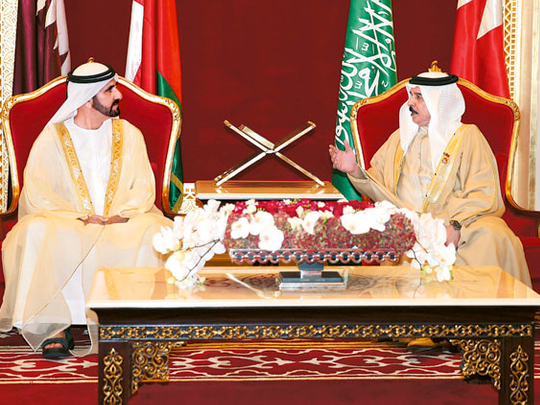
Manama: Gulf Cooperation Council (GCC) leaders and their representatives arrived in Bahrain on Monday afternoon for a summit expected to give a fresh impetus to their alliance.
The 33rd summit also seeks over two days to endorse further moves to bolster economic, environmental and security agreements between the six members of the council set up by Bahrain, Kuwait, Oman, Qatar, Saudi Arabia and the United Arab Emirates in Abu Dhabi in 1981.
King Hamad Bin Eisa Al Khalifa welcomed his five guests in Sakhir in the south of the country, just a few kilometres from the Sakhir Palace where the sixth GCC summit in Bahrain will be held.
Bahrain has hosted GCC summits earlier, two during the rule of the late Shaikh Eisa Bin Salman Al Khalifa, a co-founder of the alliance (in 1982 and 1988), and three during the rule of King Hamad (in 1994, 2000 and 2004).
Prime Minister Prince Khalifa Bin Salman Al Khalifa and Crown Prince Salman Bin Hamad Al Khalifa as well as Abdul Latif Al Zayani, the GCC secretary-general, welcomed the GCC delegations taking part in the summit.
Kuwait Emir Shaikh Sabah Al Ahmad Al Sabah led his country’s delegation to the summit while the UAE delegation was headed by His Highness Shaikh Mohammad Bin Rashid Al Maktoum, Vice-President and Prime Minister of UAE and Ruler of Dubai, the Saudis by Crown Prince Salman Bin Abdul Aziz Al Saud, the Qataris by Crown Prince Shaikh Tameem Bin Hamad Al Thani and the Omanis by Fahad Bin Mahmoud Al Saeed, the Deputy Prime Minister for the Council of Ministers.
In an arrival statement, the Omani official said that his country stressed its support to the GCC and looked forward to a successful summit in Bahrain.
“The GCC has been able to accomplish several economic and social achievements that strengthened bonds between its people,” he said. “However, the fast-paced regional and international developments and their effects on the entire world demand the conjugation of efforts to deal with them and to energise joint action mechanisms,” he said.












